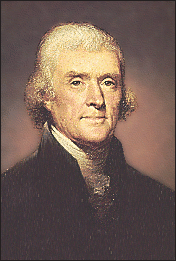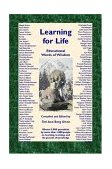


Thomas Jefferson: “Father of Democracy”Thomas Jefferson (1743-1826) was born on a Virginia estate. Thomas and his three sisters were taught by the family tutor in a little schoolhouse in the side yard. His father showed him how to ride a horse, shoot a gun, and paddle a canoe. Starting at age nine, Thomas received lessons in Latin, Greek, and French at the home of a minister. When Thomas was fourteen, his father died suddenly and Thomas became the man of the family. Thomas’s father left him a bookcase with 40 books. Thomas loved to read; he especially liked the histories of England and a book about the sun, moon, and stars. Sometimes he would sit and read for fifteen hours straight! At age seventeen, Jefferson attended William and Mary College. Thomas was a brilliant student and was curious about everything. After two years at college, he decided to study law in Williamsburg. When Virginia was still a British colony, a law was passed that forbade people to attend any church except the Church of England. Jefferson proposed that “all men should be free to have their own religious opinions and that people should not be molested, restrained, or…otherwise made to suffer on account of their beliefs.” One of the most influential Founding Fathers, Jefferson was a member of the Virginia legislature and became a delegate to the Continental Congress in 1775. He was the principal author of the Declaration of Independence, which the Continental Congress adopted. Jefferson also served his country as minister to France, secretary of state, and Vice President before becoming the third President of the United States in 1801. Soon afterward, the United States made an agreement with France to buy the vast region between the Mississippi River and the Rocky Mountains. This was called the “Louisiana Purchase” and it doubled the size of the United States. Jefferson sent the Lewis and Clark Expedition to explore the land all the way to the Pacific Ocean. Jefferson believed that virtue and talent – not money, title, or birth – was what gave a man true worth. Jefferson had a wide variety of interests and talents. He was a violinist, writer, lawyer, architect and inventor. He designed Monticello – “little mountain” – a beautiful stately home in a classical style, along with many of the objects and gadgets in it. On the grounds around Monticello, he enjoyed horseback riding and experimented with new ways of farming. Jefferson’s ingenuity was applied to building instruments of discovery and scientific analysis, as well as to the creation of numerous time-saving solutions to practical problems of everyday life. He left a legacy of innovations including the Great Clock of Monticello, a dumbwaiter system, the “Orrery” (a model of the solar system), a weathervane compass, a wheel cipher, a polygraph (letter copying device), a lap desk, revolving chair and bookstand. A noted scholar, Jefferson had so many books in his personal collection that when the British burned the Library of Congress in 1814, he was able to give the library 6,000 of his volumes and still have 4,000 left! Jefferson was also fascinated with science and had his own museum. Jefferson founded the University of Virginia and designed the original buildings. Jefferson had owned slaves all his life but came to believe that slavery was wrong. He tried to keep slavery out of the new lands that were added to the United States. A few days before he died, he wrote “All eyes are opened or opening to the rights of man.” He left instructions that his slaves were to be freed after his death. He chose for his tomb the epitaph: "Here was buried Thomas Jefferson, author of the Declaration of American Independence, of the statute of Virginia for religious freedom, and father of the university of Virginia." Did You Know...? Today, the courts and the media often refer to the "Separation of Church and State." Many Americans believe that this phrase is contained in the First Amendment of the U.S. Constitution. However, these words do not appear in the First Amendment or anywhere else in the Constitution! The First Amendment states: “Congress shall make no law respecting an establishment of religion, or prohibiting the free exercise thereof; or abridging the freedom of speech, or of the press; or the right of the people peaceably to assemble, and to petition the Government for a redress of grievances.” The "Separation of Church and State" quote was taken out of context from a personal letter that President Thomas Jefferson wrote to the Danbury Baptist Association of Connecticut on January 1, 1802. The Danbury Baptists had voiced some concerns about religious freedom, and Jefferson replied: “I contemplate with sovereign reverence that act of the whole American people which declared that their legislature should 'make no law respecting an establishment of religion, prohibiting the free exercise thereof,' thus building a wall of separation between church and State.” Jefferson was simply affirming the First Amendment as a guardian of people’s religious freedom. At the heart of Jefferson's "wall of separation" was the idea that government has no authority to regulate religious practices (as England did) or otherwise interfere with people's right to worship God. Notice that the First Amendment puts restrictions only on the government, not the people! While the words "Separation of Church and State" do not appear in the U.S. Constitution, those words were used in the Communist constitution of the former U.S.S.R. Because of his "wall of separation" quote, many people have come to think that Jefferson was an anti-Christian agnostic, or advocated that religion be barred from the government. This couldn't be further from the truth. Jefferson regularly attended church and ended his Presidential Papers with the phrase "In the year of our Lord Christ..." Nevertheless, President Jefferson committed himself to pursuing the purpose of the First Amendment: preventing the "establishment of a particular form of Christianity" by the Episcopalians, Congregationalists, or any other denomination. Engraved on the walls of the Jefferson Memorial in Washington D.C. is the following quote by our third President: "God who gave us life gave us liberty. Can the liberties of a nation be secure when we have removed a conviction that these liberties are the gift of God?" REFERENCES
Arrow Book of Presidents, by Sturges F. Cary.
Contact: . Thanks! Please click here for reprint permission.


These pages are a continuous work in progress.
|
Help Support this Site
and purchase items via our affiliate links. Thank you!
 
Thank you for visiting my |

